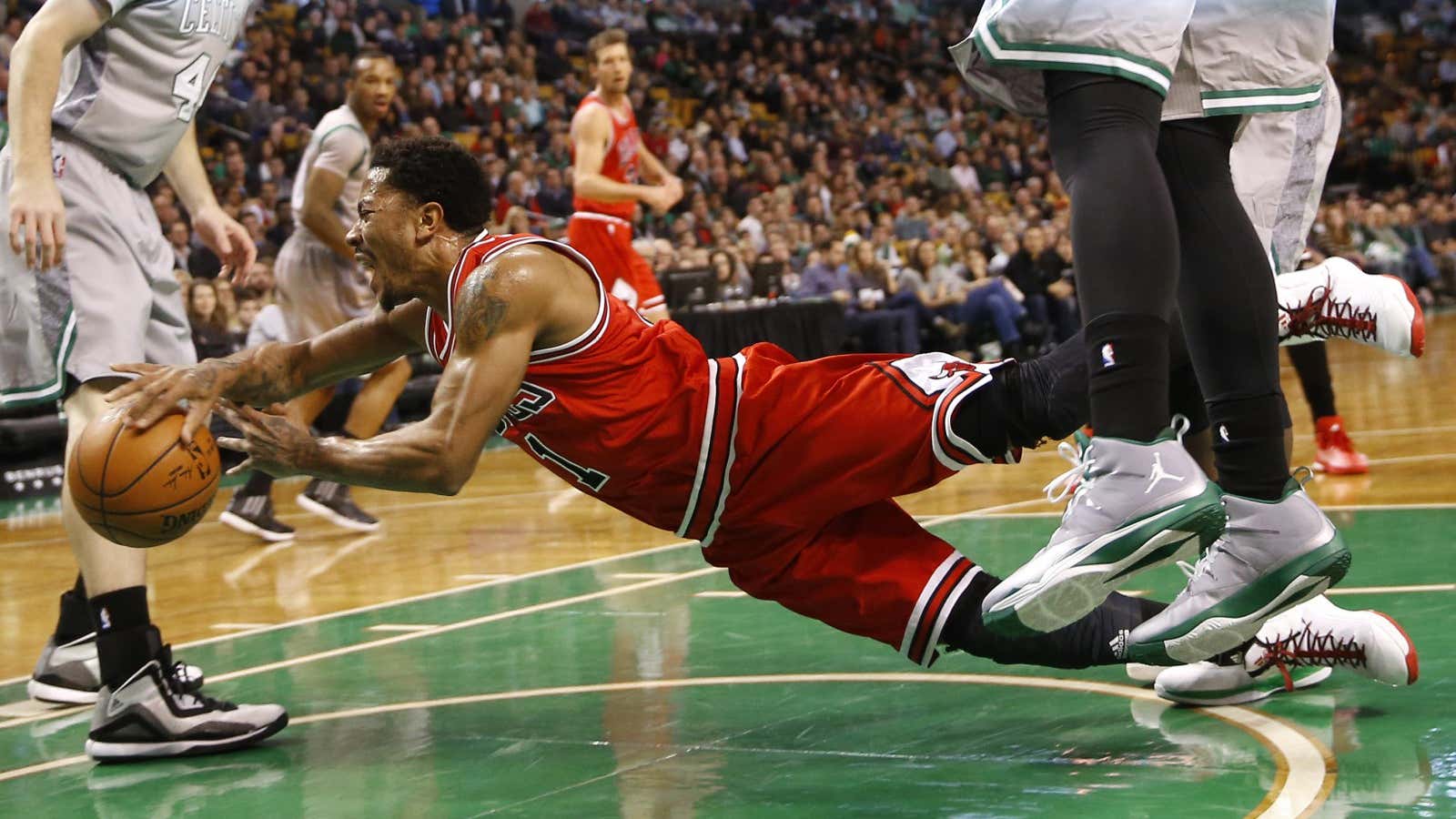On the evening of Feb. 24, a lot of important things were trending on Facebook. President Obama had just vetoed the Keystone XL pipeline expansion. Chris Kyle’s killer was found guilty. NBC’s Parks and Recreation aired its highly-anticipated series finale. But my Facebook newsfeed was dominated by something else entirely—images of Chicago Bulls point guard Derrick Rose, mid-dribble, or halfway to a dunk, splashed atop panicky headlines: “DERRICK ROSE’S INJURY SENDS SHOCK WAVES ACROSS THE NBA.”
There were missives thanking Rose for his service, as if he were some kind of war-weary veteran, hobbling home with a leg blown off. There were lengthy, poetic eulogies to his career, as if, instead of tearing a meniscus, the star had tragically perished doing something heroic. Like rescuing puppies from a collapsed mine.
I’m from Chicago. I grew up with these lugubrious goons. If Boston’s sports fans are profane, Philadelphia’s are violent, and New York’s are smug—ours are mournful. We’ve been hurt so many times in the past. This is the only way we know how to love.
Which isn’t to say we’re wholly unfamiliar with the sweet sensation of victory. The Bulls and the Blackhawks are our proverbial Xanax, keeping the lights on even as our beloved Cubs and Bears annually disappoint.
The Cubs are an especially apt case study of this Chicago sports-sadness phenomenon. Historically speaking, the Bulls are a more successful franchise, achieving a level of prowess Cubs fans haven’t experienced since the National League pennant slipped from their grasp. I’m talking about the near-apocalyptic Year of Bartman. And yet, while Forbes values the Bulls’ franchise at a whopping $2 billion compared to the Cubs’ paltry $1.2 billion, Wrigley Field majorly trumps United Center in gate receipts. In 2014, the Bulls sold $65 million in tickets. That same year, the Cubs raked in nearly double, with $117 million.
It gets more interesting. According to the NBA, 591,236 people attended Bulls games in 2014. MLB reports 2,652,113 people attended Cubs games. Now, that’s a sharp decline from 2008, when more than 3 million crowded into Wrigley; but it’s an amazing disparity, considering the success gap. Clearly, it doesn’t take any actual winning to be a #winning franchise in Chicago.
It’s worth noting that Wrigley operates at nearly double the capacity of United Center, which might explain the difference in ticket sales. But it does not explain away the fact that five times as many people went, in person, to watch the Cubs play horrifically last season then watched the Bulls actually compete.
But Wrigley has history, they say—and there’s truth to that. Enjoying a Goose Island on the bleachers above the ivy-strewn outfield wall is a veritable Chicago tradition. (On the North Side, at least.) United Center, on the other hand, looks like the world’s grimmest Amtrak terminal.
Moreover, the Bulls were founded in 1966, nearly a century after the the Cubs (born 1870). The Cubs have a transgenerational appeal the Bulls, simply put, do not. And that’s a mathematical fact present across American sports history. Major-league baseball has been “the American past time” since 1869; the NBA got its start in 1949.
But in the time since the Cubs won their last World Series—1908—the Bulls have one six NBA championships, six conference titles, and nine division titles. Surely, if nothing else, those enchanted Jordan years should have shored up a more substantial and committed fan-base than those perennially underwhelming North Siders. The Cubs, after all, haven’t managed to eke out a National League pennant since 1945! (For which some blame a bar-owning witchdoctor and his magical goat.)
So, sure—history, and that ever elusive “character” (as in, “but Wrigley has so much character!”) give the Cubs a boost. But I’d argue there’s something more subtle at work. This penetrating sadness—a Victorian melancholia, almost—is the kind of grief you savor. Like a toxic relative who acts out at family gatherings, you bank the resentment. You jar and preserve the disappointment. You let it build up, until it deliciously boils over in the company of likeminded souls, your fellow tormented; and you bask in the terrible glory of shared heartache.
Nary a Thanksgiving dinner goes by in the greater Chicagoland area without a collective “airing of grievances,” Festivus-style, in which we recount the various failures of the latest football or baseball season. “They gotta fire Renteria.” (They fired Renteria.)
“Epstein is a complete moron!” (Debatable.)
“Well, another year, another shit show.” (Most likely, yes.)
Misery loves company. Weathered by centuries of sub-Arctic winter and comically corrupt politics, Chicagoans, more than anyone else, know how to how to be miserable, and have fun at the same time. In his book, A Little Place On the North Side, political columnist George Will—a fellow, long-suffering Cubs fan—notes that, although Wrigley’s ticket prices are the third highest in the MLB, it is third cheapest in stadium beer prices. Sadness marketing at its finest, folks.
So heal up soon, Derrick! Or don’t. A dejected fan base never hurt a Chicago team before. It’s perhaps the only city in the world where underperformance sells seats. And beer.
